Polish Music Reference Center Newsletter Vol. 14, no. 8
PMC News
Review Of Vol. 10
 Polish Music History Series Vol. 10 by Joseph A. Herter, entitled Zygmunt Stojowski—Life and Music, has been reviewed very favorably in the most recent volume of the The Polish Review (Vol. LIII 2008 no. 2, pp. 246-249). The Polish Review is a quarterly multidisciplinary journal published by The Polish Institute of Arts and Sciences (PIASA) in New York. The following is excerpted from Anne Swartz’s review:
Polish Music History Series Vol. 10 by Joseph A. Herter, entitled Zygmunt Stojowski—Life and Music, has been reviewed very favorably in the most recent volume of the The Polish Review (Vol. LIII 2008 no. 2, pp. 246-249). The Polish Review is a quarterly multidisciplinary journal published by The Polish Institute of Arts and Sciences (PIASA) in New York. The following is excerpted from Anne Swartz’s review:
Herter presents excellent descriptive commentary concerning Stojowski’s works…[His] meticulous research extends to the two Appendices to the book, both of which illuminate the composer’s compositional and performance style in America during the early decades of the twentieth century… Herter writes in an engaging style that appeals to scholars of Polish music and reception history, and to a general readership interested in pursuing the artistic connections that contributed to Stojowski’s success in America in the period between the two World Wars.
Zygmunt Stojowski—Life and Music is available for purchase through the Polish Music Center, either by phone at (213) 821-1356 or by email at polmusic@thornton.usc.edu. For more details, visit www.usc.edu/dept/polish_music/pmhsbooks/historyser.html.
Stojowski and Poland’s Gold
Addendum to Zygmunt Stojowski: Life and Music
For many it will come as a complete surprise that Polish pianist and composer Zygmunt Stojowski played a crucial role in the rescue of Polish gold which was in possession of the French Vichy government during the Second World War. In the first nine months of the war, Polish gold bullion was transported to the French colonial city of Dakar, the main port and current capital of Senegal in West Africa. Starting in Warsaw and reaching Lublin, the rescue itinerary passed through Romania, Turkey and Lebanon before reaching Toulon, France. On June 16-17, 1940, in the ports of Brest and Lorient, 1,200 tons of French gold, 200 tons of Belgian gold and 75 tons of Polish gold were shipped to Dakar, with the transport passing through Casablanca in Morocco.
During the September 1940 Battle of Dakar, the British navy attempted to force French colonial administration in Dakar to join the Allied cause and detach it from the pro-Nazi Vichy regime. The Allies lost the battle, and Poland’s gold deposits remained in the hands of the enemy.
Knowing that the French government, via the Banque de France, had several hundred tons of gold in the American Federal Reserve Bank, the Bank of Poland appealed to the Federal Court in New York asking that they be reimbursed with a similar amount to that held in Dakar. The Court ruled in favor of the Poles, but the French returned only a small amount of what was assessed by the courts. Nonetheless, the Polish Government-in-Exile continued to press its claim for the return of the gold. In response, the pro-Vichy administration in Dakar moved the 6,000 cases of French, Belgian and Polish gold farther inland to Kayes, Mali, on the River Senegal.
 In September 1941, the Poles appealed to the New York Federal Court a second time. Since the Bank of Poland had no legal representation in the United States, its goods and interests were transferred to two Polish musicians living in New York City, Zygmunt Stojowski and his colleague Roman Majewski of Steinway House, near Carnegie Hall. The Court once more ruled in favor of the Poles giving them $728 million of the French gold held in trust by the Federal Reserve Bank as guarantee for the Polish gold held in the deserts of Africa.
In September 1941, the Poles appealed to the New York Federal Court a second time. Since the Bank of Poland had no legal representation in the United States, its goods and interests were transferred to two Polish musicians living in New York City, Zygmunt Stojowski and his colleague Roman Majewski of Steinway House, near Carnegie Hall. The Court once more ruled in favor of the Poles giving them $728 million of the French gold held in trust by the Federal Reserve Bank as guarantee for the Polish gold held in the deserts of Africa.
It was a short-lived victory for Poland. As Alfred Draper in his book, Operation Fish, writes, “the Russians were to enter the gold stake and prove every bit as ruthless as Vichy France and its Nazi masters.”1When the war ended, America and Britain had to recognize the communist government in Warsaw, and the exiled Bank of Poland had to relinquish its rights to the gold held in Africa, as did the new communist National Bank of Poland. In January 1946, the question of the Polish gold held in America was settled: Poland’s communist government paid Britain 32 million pounds for operation costs incurred by the Polish Government-in-Exile in London. Of this amount, however, only three million was in gold.
This additional information on Stojowski’s role as a Polish patriot during World War II will hopefully give further insight to the correspondence between Bank Polski and the law firm Sullivan & Cromwell to Stojowski quoted in the biography, Zygmunt Stojowski: Life and Music by Joseph A. Herter. It also sheds new light on the high esteem and trust that the Polish Government-in-Exile held for this now unjustly forgotten son of Poland.
[JH]
1 See “The raid on Dakar” in Operation Fish by Alfred Draper, Don Mills, Ontario, Canada: General Publishing Co. Limited, 1979, pp. 283-302.
News
Sembrich Heritage Celebration
 It is said that a respected music critic of the New York Times once referred to internationally renowned Polish soprano Marcella Sembrich (1858-1935) as the greatest female voice in the history of the New York’s Metropolitan Opera. She first sang with the Metropolitan Opera in its initial season in 1883, later retiring from the Met in 1909, and singing concert tours until 1917. In addition to her stellar performing career, Mme. Sembrich gained preeminence as a vocal teacher at the Juilliard School and the Curtis Institute, where she was the first head of the vocal department when it opened in 1924. In her later years, she summered in the Adirondack Mountains at Lake Placid from 1915 to 1921, and then on Lake George, the location of her final studio which is now the site of the Museum, from 1922 to 1934.
It is said that a respected music critic of the New York Times once referred to internationally renowned Polish soprano Marcella Sembrich (1858-1935) as the greatest female voice in the history of the New York’s Metropolitan Opera. She first sang with the Metropolitan Opera in its initial season in 1883, later retiring from the Met in 1909, and singing concert tours until 1917. In addition to her stellar performing career, Mme. Sembrich gained preeminence as a vocal teacher at the Juilliard School and the Curtis Institute, where she was the first head of the vocal department when it opened in 1924. In her later years, she summered in the Adirondack Mountains at Lake Placid from 1915 to 1921, and then on Lake George, the location of her final studio which is now the site of the Museum, from 1922 to 1934.
The Marcella Sembrich Memorial Association is a membership association whose mission is to preserve the Sembrich collection and to maintain the memorial Museum housed in the great singer’s former teaching studio on Lake George in Bolton Landing, NY. The Museum was first opened in 1937 by Mme. Sembrich’s daughter-in-law, Julliette de Coppet Stengel. In this Year of Sembrich, the Sembrich Association is presenting a number of special events celebrating this great Polish soprano’s life and legacy. Richard Wargo, Museum curator and artistic director, describes museum events thus: “It’s not just the museum preserving a capsule of time. We preserve the spirit through live performances. The setting is perfect for concerts, because it hearkens back to the European salon settings.” (quoted by Doug Gruse in the Post-Star of upstate New York)
 On Saturday, August 9, there will be a day-long musicological symposium at the Museum. This event features three musicologists and grantees of the Kosciuszko Foundation: Malgorzata Komorowska, Stephen Herx, and Joseph A. Herter (PMC Paderewski Lecturer from 2006, and author of Zygmunt Stojowski: Life and Music). Below are details on this and several other events happening during the Sembrich Heritage Week, August 3 – 9, 2008.
On Saturday, August 9, there will be a day-long musicological symposium at the Museum. This event features three musicologists and grantees of the Kosciuszko Foundation: Malgorzata Komorowska, Stephen Herx, and Joseph A. Herter (PMC Paderewski Lecturer from 2006, and author of Zygmunt Stojowski: Life and Music). Below are details on this and several other events happening during the Sembrich Heritage Week, August 3 – 9, 2008.
- August 3, 7:30 pm: “A Concert of Polish Songs and Arias” with mezzo soprano Justyna di Biaggio and Valerian Ruminski
- August 6, 5:00 pm: “A Celebration of Polish Culture”- Poetry, Art and Musical Interludes
- August 9, 11:00 am & 1:30 pm: SEMBRICH SYMPOSIUM With musicologists M. Komorowska, S. Herx & J. A. Herter (pictured above)
For a full listing of all events, visit www.operamuseum.org/calendar.htm.
Salzburg Festspiele
Founded by composer Richard Strauss, poet and dramatist Hugo von Hofmannsthal, and director Max Reinhardt, the Salzburg Festival was born on August 22, 1920. Nestled in the princely baroque town of Salzburg, far from the everyday bustle of the big cities, the Salzburg Festival was immediately recognized as a major destination by the world’s foremost directors and artists. Visitors from 63 countries gather every summer to enjoy the nearly 180 performances—operatic, symphonic, solo, chamber, and dramatic—spanning six weeks in the numerous concert halls and theaters, including the legendary Felsenreitschule (summer riding school) and the Grosses Festspielhaus.
[Text from the Festival website: www.afsalzburgfestival.com]
This year there will be four artists representing Poland during this outstanding musical event. Anna Radziejewska, soloist of the Warsaw Chamber Opera, will perform in sold out production of Lucia mie traditrici [My Treacherous Eyes] by Salvatore Sciarrino on August 3. On August 12, Krystian Zimmerman will perform a solo piano recital of works by Bach, Brahms, Szymanowski and Bacewicz. Rafał Blechacz will celebrate his debut performance at the festival on August 15 with a recital of works by Chopin, Bach, Liszt and Debussy. Lastly, on August 17, Piotr Beczała will appear in sold out premiere of Dvorak’s opera Rusalka.
[Translated from: muzyka.onet.pl]
ZAiKS In Trouble
Poland’s Internal Revenue Service has recently withdrawn 96 million PLN (approx. $48 million USD) for past due taxes from Poland’s Association of Stage Authors and Composers, ZAiKS (Związek Autorów i Kompozytorów Scenicznych). According to the IRS, ZAiKS should have been paying VAT since 2004, while according to ZAiKS, as a non-benefit organization they are exempt from taxation. Recently a European Commission got involved and backed up the claim of the Polish IRS. As a result, IRS has taken a third of an estimated 300 million PLN that ZAiKS supposedly owes since 2004.
The money recently paid by ZAiKS came out of their revenue reserves. According to Edward Pałłasz, chairman of ZAiKS, the association is in no immediate financial trouble, but will have to change the way they compute the royalties to artists and increase membership fees. ZAiKS will also back out of their public service programs and cultural support initiatives to save additional money. ZAiKS is appealing the decision, but if the appeal fails, Pałłasz will consider transforming the association into a commercial entity.
[Information translated from: wiadomosci.polska.pl and wyborcza.pl]
Szymanowski At Summerscape
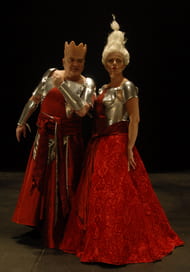
This summer, Bard SummerScape in New York is presenting music by Karol Szymanowski, who is widely considered the father of modern Polish music, as a part of their exploration of “Prokofiev and his World.” The double-bill includes the opera Król Roger [King Roger] and Harnasie, a pastoral dance. This production features stage direction and design by Lech Majewski, who called Szymanowski’s music “enchanting” in a recent interview with Playbill Arts (read the entire article here: www.playbillarts.com/features/article/7710.html). Music director Leon Botstein leads the SummerScape resident orchestra, the American Symphony Orchestra. Performances began on July 25th and continue through August 3rd. See the SummerScape or Fisher Center websites for performance details.
Adam Kruszewski, baritone & Iwona Hossa, soprano pictured above
Polish Music In Edinburgh
There will be several performances of Polish music or by Polish performers during this year’s Edinburgh Fringe Festival in Edinburgh, Scotland. Several of the groups are theatrical (see a list of these Polish performers here), but one is uniquely musical: Affabre Concinui.
From Renaissance to contemporary music, and with their astonishing and unique imitation of musical instruments, Robert Hylla, Leszek Marciniak, Przemysław Czekała, Piotr Lewandowski, Piotr Dziurla and Artur Hoffmann are perfectly attuned. Their group, Affabre Concinui, originates from Poznań and their first CD, comprising of music from the Polish Renaissance, was recorded in 1991. Since then they have developed a repertoire of 300 pieces of music ranging from Renaissance to contemporary music, traditional songs from Poland and all over the world, orchestral works, all featuring a unique and astonishing imitation of musical instruments. Composers of their performed music include Palestrina, Schubert, Schumann, Chopin, Moniuszko, and Penderecki. Learn more about the group at their official website: www.affabreconcinui.com.pl
St. Andrew’s & St. George’s Church
Friday, 8 August at 12:30
Sunday, 10 August at 14:15
Monday, 11 August at 16:30
Tuesday, 12 August at 16:30
Eastgate Arts Theatre and Arts Centre
Sunday 10 August at 20:00
On another part of Edinburgh’s cultural landscape, Szymanowski’s Król Roger will be performed at this year’s Edinburgh International Festival of theater on August 25 & 27.Valery Gergiev will conduct the Mariinsky Opera Company in a production that was originally staged by Opera Wrocławska. Set in 12th century Sicily, Szymanowski’s opera explores the cultural crossroads of the time – Byzantine, Arabic, Greek and European. A deeply philosophical work, the music has a sweeping romanticism and lyricism that encompasses a first act immersed in religious atmosphere, through a second act built around oriental and exotic dance and culminating in the idealism and passion of the third act.
Edinburgh Festival Theatre
25 August & 27 August at 7:15pm
[Information gathered from the Polish Cultural Inst. UK]
A Decision On Chopin’s Heart
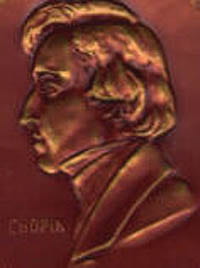 You may recall the article in last month’s Newsletter entitled “Secrets in Chopin’s Heart,” regarding the controversy over whether to remove Chopin’s heart from its urn in order to determine if he possibly had cystic fibrosis rather than tuberculosis, as has always been assumed. There was a great deal of conviction and passion on both sides of the argument, but it seems that the conflict has been resolved. Vanessa Gera of the Associated Press gives us this report: “A spokeswoman for the Culture Ministry, Iwona Radziszewska, told The Associated Press on Thursday that ministry officials consulted experts and decided that ‘this was neither the time to give approval, nor was it justified by the potential knowledge to be gained.’” Read the whole article here: news.yahoo.com.
You may recall the article in last month’s Newsletter entitled “Secrets in Chopin’s Heart,” regarding the controversy over whether to remove Chopin’s heart from its urn in order to determine if he possibly had cystic fibrosis rather than tuberculosis, as has always been assumed. There was a great deal of conviction and passion on both sides of the argument, but it seems that the conflict has been resolved. Vanessa Gera of the Associated Press gives us this report: “A spokeswoman for the Culture Ministry, Iwona Radziszewska, told The Associated Press on Thursday that ministry officials consulted experts and decided that ‘this was neither the time to give approval, nor was it justified by the potential knowledge to be gained.’” Read the whole article here: news.yahoo.com.
Mehta, Huberman & The Israel Phil
On July 23rd, the Sydney Morning Herald reported on internationally renowned conductor Zubin Mehta and his unique relationship with the Israel Philharmonic Orchestra. The musicians of this orchestra have bestowed upon their beloved leader the highly unusual title of “music director for life.” In her article, author Harriet Cunningham discusses the interesting roots of the Orchestra itself, which began with a Pole who was searching for a musical home for persecuted European Jewish musicians.
The Israel Philharmonic was founded in 1936, the year of Mehta’s birth. Originally known as the Palestine Orchestra, it was founded by the Polish violinist Bronislaw Hubertin [sic! – actually referring to Bronislaw Huberman]. He persuaded many Jewish musicians, who were being fired from orchestras around Europe, to relocate to Palestine.
Learn more about the fascinating personalities and dedicated musicianship of both Zubin Mehta and Bronislaw Huberman on their respective websites.
Pieczonka Revealed
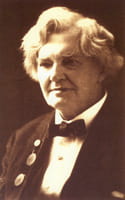 Although long shrouded in mystery, the life and works of Albert Pieczonka, composer of the famous Tarantella in A Minor for piano, are now revealed.
Although long shrouded in mystery, the life and works of Albert Pieczonka, composer of the famous Tarantella in A Minor for piano, are now revealed.
Albert Emil Theodor Pieczonka (1828-1912) was born in Königsberg, East Prussia on February 10, 1828. The Pieczonka family was originally from Leszno, Poland—at the time it was called Lissa, after having been annexed by Prussia—and immigrated to Königsberg shortly after the French Revolution. In 1880, Albert Pieczonka emigrated from Europe to the U.S. Although he spent this time composing, performing and teaching away from his homeland, a survey of Pieczonka’s works reveals a strong connection to his Polish heritage. He wrote several mazurkas and polonaises, Polish Dance, Wanda, Polacca, and his once well-known, Hommage à la Pologne (Polish Chivalry). The Hommage was featured in The Etude magazine in February 1915, a volume that was dedicated to Polish music.
During his prolific career, Pieczonka composed a Tarantella for piano that is as famous and popular today as it was back in the 1880s, and yet his life and career have remained a mystery for nearly a hundred years. Not even his dates were notated in any reference texts. This may have been because many researchers were looking for him in Europe when, in fact, he had immigrated to America. Pianist Stephen Erickson has picked up the faint trail of this once famous composer and filled in the blanks with extensive research. His latest article is featured in the Keyboard Companion Summer 2008 issue (Volume 19, Number 2) – the article is available on the magazine’s website here: www.keyboardcompanion.com. For more information about Pieczonka and Erickson’s other articles, visit www.albertpieczonka.org.
Opera Circle Events
Opera America Conference
Dorota Sobieska, Executive Director of Cleveland’s Opera Circle, represented the program at the Opera America Conference at the National Performing Arts Convention in Denver, CO on June 10-14. Opera Circle garnered attention through its unique programs, particularly the Bellini Series and the world premiere of Thamos, King of Egypt by Halim El-Dabh/W.A. Mozart, as well as Opera Circle’s focus on Szymanowski, which places the innovative company ahead of the curve. To highlight the importance of Szymanowski in the opera world, the Conference’s keynote speaker Gerard Mortier, the general manager designate of New York City Opera, is planning to produce Szymanowski’s King Roger. While reading his entire list of planned premieres, Monier stopped only at King Roger, commenting on the outstanding beauty of Szymanowski’s music. Monier’s speech juxtaposed the value of high-definition opera transmission with human presence, warning that this new technological development must be approached with caution.
Meet-the-Artist: An Evening with Piotr Beczala
 On May 31st, Opera Circle of Cleveland hosted an evening with the outstanding tenor Piotr Beczala at the Polish-American Cultural Center. Having performed major roles in major opera houses, Piotr Beczala maintains an approachable aura in answering questions that mirrors his friendly stage presence, inviting all to communicate with him. In the interview, he stressed that singing is not reserved only for the chosen: everyone has a voice and can use it, if not for solo then for choral singing or other opportunities. His own path to mastering voice has been a challenging one, and he encouraged others not to give up in their pursuits. Piotr Beczala repeated the same philosophy at his one-hour radio program on WCPN with Dorota and Jacek Sobieski, hosted by Eugenia Stolarczyk, on June 1, 2008. (Dorota Sobieska and Piotr Beczala pictured above)
On May 31st, Opera Circle of Cleveland hosted an evening with the outstanding tenor Piotr Beczala at the Polish-American Cultural Center. Having performed major roles in major opera houses, Piotr Beczala maintains an approachable aura in answering questions that mirrors his friendly stage presence, inviting all to communicate with him. In the interview, he stressed that singing is not reserved only for the chosen: everyone has a voice and can use it, if not for solo then for choral singing or other opportunities. His own path to mastering voice has been a challenging one, and he encouraged others not to give up in their pursuits. Piotr Beczala repeated the same philosophy at his one-hour radio program on WCPN with Dorota and Jacek Sobieski, hosted by Eugenia Stolarczyk, on June 1, 2008. (Dorota Sobieska and Piotr Beczala pictured above)
Expanding on his views and specifically addressing his path to creating the character of the Prince in Dvorak’s Rusalka, Piotr Beczala more thoroughly expressed himself in the interview conducted by Donald Rosenberg for The Plain Dealer. The interview focused on his performance of the opera with the Cleveland Orchestra on June 5 and 7 at Severance Hall, and then in Salzburg in August 2008. Opera Circle continues to present recordings of Piotr Beczala on the Eugenia Stolarczyk WCPN Program in Cleveland on 90.3 FM, Sunday nights at 9 p.m.
[Text excerpted from the Opera Circle email newsletter]
Namyslowski & Hamilton At Jazz Score
The NY Museum of Modern Art’s exhibit entitled Jazz Score (April 16 – September 15) includes a broad representation of Polish films, many with scores by Krzysztof Komeda, among other films with music by Duke Ellington, Miles Davis, Dizzy Gillespie, Modern Jazz Quartet, Thelonius Monk, Toru Takemitsu, and Wynton Marsalis. Events also include two live performances and an international gallery exhibition that features Polish posters for films with jazz scores, among many other artifacts
In May, MoMA’s Jazz Score featured a celebration of music by Krzysztof Komeda through films and a concert tribute by Tomasz Stanko. On August 1, 3, 7 & 9, Polanski’s Repulsion with music by Chico Hamilton and the first experimental film by Zbigniew Rybczynski, Plamuz, with music by Zbigniew Namyslowski, will be screened. These are just two among the more than 100 films presented, inculding such classics as Louis Malle’s Elevator to the Gallows with music by Miles Davis and Antonioni’s Blow-Up with music by Herbie Hancock.
[Information from Polish Cultural Institute in NY]
Awards
Annual ZKP Awards
The Polish Composer’s Union (ZKP) has announced the recipients of the annual ZKP Award. The jury, comprised of Zofia Helman, Lidia Zielińska, Sławomira Żerańska-Kominek and Krzysztof Knittel, decided that one of the awards will go to Małgorzata Gąsiorowska for her involvement in promotion of the Polish contemporary music through the research and publication of her book Grażyna Bacewicz. Also honored this year is Tadeusz Wielecki, for outstanding achievements in composition and dedication to Polish contemporary music. The awards will be given during the 51st Warsaw Autumn Festival in Warsaw this September.
 Małgorzata Gąsiorowska is a music critic and theoretician. Over the years she has worked for the Polish Radio, Ruch Muzyczny, and the Kraków Music Academy. In 1999, she organized the “Days of Music of Grażyna Bacewicz” with Jacek Rogala. She is a contributing author with PWM editions and a member of the Musicology Section of the Polish Composer’s Union.
Małgorzata Gąsiorowska is a music critic and theoretician. Over the years she has worked for the Polish Radio, Ruch Muzyczny, and the Kraków Music Academy. In 1999, she organized the “Days of Music of Grażyna Bacewicz” with Jacek Rogala. She is a contributing author with PWM editions and a member of the Musicology Section of the Polish Composer’s Union.
 Tadeusz Wielecki is a composer and a double-bass player. As a performer he has presented his art all around the world. He has hosted broadcasts presenting modern music to young audiences for Polish Radio. He has taught at the Darmstadt International Festival and Florida State University-Tallahassee. Since 1999 he has been the director of the Warsaw Autumn Festival of contemporary music.
Tadeusz Wielecki is a composer and a double-bass player. As a performer he has presented his art all around the world. He has hosted broadcasts presenting modern music to young audiences for Polish Radio. He has taught at the Darmstadt International Festival and Florida State University-Tallahassee. Since 1999 he has been the director of the Warsaw Autumn Festival of contemporary music.
[Information translated from www.zkp.org.pl, www.pwm.com.pl & muzyka.onet.pl]
Beczala Lauded In Munich
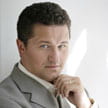 Polish tenor Piotr Beczala was bestowed the honorific title of “Best Singer” by critics at the 2008 Opera Festival in Munich. During the Festival, Beczala performed the title role of Werther, for which he received a standing ovation after the famous Act III aria, as well as in Rigoletto and Der Rosenkavalier.
Polish tenor Piotr Beczala was bestowed the honorific title of “Best Singer” by critics at the 2008 Opera Festival in Munich. During the Festival, Beczala performed the title role of Werther, for which he received a standing ovation after the famous Act III aria, as well as in Rigoletto and Der Rosenkavalier.
According to the Polish Radio Cultural section, “2008 has been very successful for Beczala. After his debut in Berlin’s Staatsoper as Riccardo in Verdi’s The Masked Ball, German critics described him as the best Riccardo since Pavarotti’s appearance in that role. He also recorded a selection of opera arias for the Orfeo label.”
Washington Int’l Piano Competition
The 2008 Washington International Piano Artists Competition was held on the 22nd of July. This competition is open to non-professional performers who are 31 years old or above. It is organized by the Washington International Piano Arts Council. This year, 26 pianists competed and Mariusz Brymora, the Cultural Counsellor for the Polish Embassy in Washington D.C., chaired the jury for the third year.
In order to promote Polish music, the Embassy of the Republic of Poland in Washington offers an award for the best performance of music by any Polish composer during the competition. Surprisingly, as many as 21 participants included Polish music in their competition programs. The Polish music prize was awarded to Rebecca Davis from Minnesota for her highly expressive performance of Fryderyk Chopin’s compositions. The overall first place of the competition was taken by Vincent Schmithorst, a researcher from Ohio.
This year’s festival concluded with a recital of Polish piano music performed by Janice Weber, one of the jurors, at the Embassy of the Republic of Poland in Washington. Ms. Weber, a well-known American pianist, performed compositions by Fryderyk Chopin, Ignacy Jan Paderewski and Grażyna Bacewicz.
[Text excerpted from the Polish Embassy press release for this event]
Performances
Zdarzyło się w Jeruzalem Review
By Bartek Ziegler, Ph.D
26 June 2008
The world premiere of a new ballet, Zdarzyło się w Jeruzalem [It happened in Jerusalem], was given by the Kielce Dance Theatre in Kielce, Poland, on June 26. The libretto by Henryk Jachimowski is based on the timeless story of Romeo and Juliette’s star-crossed love, but set in contemporary Jerusalem rather than in the Renaissance Verona. Music for the ballet was written by one of Poland’s most popular contemporary composers, Krzesimir Dębski, and the choreography was provided by Elżbieta Szlufik-Pańtak.
 This story of a young Jewish boy who meets a Palestinian girl within the tragic framework of the Middle East conflict begins with thunderous pandemonium, unleashed on stage by a group of black-robed dancers in stark-white masks, expertly choreographed in a massive ensemble number. The heavy pulse of pounding drums and the dramatic voice of the soloist, Jorgos Skolias, lent an additional aura of tension and drama to the memorable opening scene.
This story of a young Jewish boy who meets a Palestinian girl within the tragic framework of the Middle East conflict begins with thunderous pandemonium, unleashed on stage by a group of black-robed dancers in stark-white masks, expertly choreographed in a massive ensemble number. The heavy pulse of pounding drums and the dramatic voice of the soloist, Jorgos Skolias, lent an additional aura of tension and drama to the memorable opening scene.
When the curtain is lifted to reveal a disco-like stage, we meet the protagonists—the Jewish Romeo, portrayed by Maksim Wojtiul, the powerful lead dancer from the Warsaw Ballet, and his Palestinian Juliette, played by Ewelina Kubot. Strands of ancient folk melodies expertly woven into Dębski’s exquisite score provided just the right touch of ethnic color to the music, and were beautifully co-choreographed by Grzegorz Pańtak, who also performed as solo dancer.
Love and innocence are interrupted by black leather-clad policemen. Led by a high-heeled dominatrix, they burst on stage in a sequence that, although effective, had some uneven moments. The wall separating the Palestinian and Jewish groups works well as a potent and politically relevant if somewhat overused symbol, pitting ruthless government policies against the natural instincts of human affection. Another stunning and stark moment reveals a nearly naked triptych of dancers bathed in surreal bright light, symbolizing hope and transcendence. The idea of redemption through love is further developed in the final scene, where a fistful of white sand poured onto a playground leaves the viewer with an indelible impression of a conflict for which there are no easy solutions.
Although a few scenes might benefit from tighter pacing and less repetitious use of the wall, which once established remains firmly in the viewer’s imagination, the overall impression made by this ballet was quite positive. A large part of the credit goes to Maestro Jacek Rogala and Filharmonia Świętokrzyska, who rose to the occasion by performing Dębski’s complex and colorful score with authority, zeal and verve. Stage sets, designed by Boris Kudlička and Arkadiusz Chrustowski, as well as costumes by Anna Maria Klikowicz and lighting by Maciej Igielski, effectively contributed to the gritty atmosphere of this contemporary drama. A few minor mechanical glitches with the movable wall seemed quite a propos but, if need be, could be solved with a dab of grease or an occasional orchestral sforzando.
The enthusiastic audience at the June 26 performance included Poland’s First Lady, Maria Kaczyńska, and many foreign guests. The gala performance combined the celebrations of the Polish Year in Israel and Israeli Year in Poland as well as the anniversary festivities of the City of Kielce. It was a fascinating evening for the cast and crew, and the musicians of Filharmonia Świętokrzyska, which was founded in 1920 but only recently began to rise in prominence within Poland. Thanks to a transcendent score, stunning choreography, and unfaltering unity between dancers and musicians, this production in Kielce should become a musical export very soon.
Dylla In Alexandria
 On July 18th, Polish guitarist Marcin Dylla performed at the Alexandria Guitar Festival, a week-long festival of concerts and masterclasses held at the George Washington Masonic Memorial in Alexandria, VA. This festival highlights the young and virtuosic amongst the guitarists of the world, and thus the audiences are filled with international aficionados and players alike. Marcin Dylla was one of the most anticipated acts of this year’s festival. Washington Post reviewer Stephen Brookes was dully impressed with the Pole, and highlighted Dylla’s performance amongst the many other excellent concerts:
On July 18th, Polish guitarist Marcin Dylla performed at the Alexandria Guitar Festival, a week-long festival of concerts and masterclasses held at the George Washington Masonic Memorial in Alexandria, VA. This festival highlights the young and virtuosic amongst the guitarists of the world, and thus the audiences are filled with international aficionados and players alike. Marcin Dylla was one of the most anticipated acts of this year’s festival. Washington Post reviewer Stephen Brookes was dully impressed with the Pole, and highlighted Dylla’s performance amongst the many other excellent concerts:
If there were any doubt that Dylla ranks among the most gifted guitarists on the planet, they were dispelled on Friday night. Dylla can seem a bit theatrical at times; his face becomes a twitching map of emotion when he plays. But each work on the short program — including Nicholas Maw’s brilliant, diabolically difficult “Music of Memory” — was almost achingly poetic. This is definitely a guitarist to watch.
Read the entire article here: www.washingtonpost.com.
King Roger in St. Petersburg
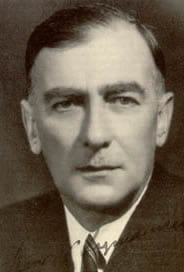 A performance of Karol Szymanowski’s opera King Roger took place on July 16, 2008 in Mariinsky Theater in St. Petersburg, Russia. The staging was conducted by Valery Gergiev and was prepared in cooperation with Wrocław Opera. The soloists included Polish and Russian singers: Andrzej Dobber, Elżbieta Szmytka, Sergei Semishkur, Pavlo Tolstoy, Yuri Vorobiev, and Lyubov Sokolova. The opera was directed by Mariusz Treliński with set designs by Boris Kudlicka, costumes by Wojciech Dziedzic and choreography by Tomek Wygoda. The opera was performed in Polish and will be repeated at the Edinburgh International Festivalof theater on August 25 & 27.
A performance of Karol Szymanowski’s opera King Roger took place on July 16, 2008 in Mariinsky Theater in St. Petersburg, Russia. The staging was conducted by Valery Gergiev and was prepared in cooperation with Wrocław Opera. The soloists included Polish and Russian singers: Andrzej Dobber, Elżbieta Szmytka, Sergei Semishkur, Pavlo Tolstoy, Yuri Vorobiev, and Lyubov Sokolova. The opera was directed by Mariusz Treliński with set designs by Boris Kudlicka, costumes by Wojciech Dziedzic and choreography by Tomek Wygoda. The opera was performed in Polish and will be repeated at the Edinburgh International Festivalof theater on August 25 & 27.
[Source: wiadomosci.polska.pl]
Mariusz Smolinski Trio In Russia
 The Mariusz Smolinski Trio played jazz concerts in Vyborg (5 July) and St. Petersburg (6 July, Jazz Philharmonic) as a part of the Polish Season in Russia 2008 “Poland-Russia_Dialogue of Cultures.” Mariusz Smolinski (pictued at left) is a pianist with the Jazz society of Gorzów and Zielona Góra, a student at the Music Academy in Wrocław and the co-founder of the Conception group, which has received a number of awards at jazz festivals and competitions. The Mariusz Smolinski Trio also includes Pawel Czarka (bass) and Karol Gola (saxophone).
The Mariusz Smolinski Trio played jazz concerts in Vyborg (5 July) and St. Petersburg (6 July, Jazz Philharmonic) as a part of the Polish Season in Russia 2008 “Poland-Russia_Dialogue of Cultures.” Mariusz Smolinski (pictued at left) is a pianist with the Jazz society of Gorzów and Zielona Góra, a student at the Music Academy in Wrocław and the co-founder of the Conception group, which has received a number of awards at jazz festivals and competitions. The Mariusz Smolinski Trio also includes Pawel Czarka (bass) and Karol Gola (saxophone).
[Source: www.iam.pl]
Brecker And Włodek Pawlik Trio
American jazz trumpet star Randy Brecker headlined a jazz concert in Białystok on July 4 that was organized by the U.S. Embassy. Brecker performed with Poland’s Włodek Pawlik Trio (Włodek Pawlik – piano, Paweł Pańta – bass, Cezary Konrad – percussion) and Białystok’s Orkiestra Filharmonii Podlaskiej, with conductor Marcin Nalecz. The group performed Wlodek Pawlik’s jazz suite Tykocin. Brecker and the Wlodek Pawlik Trio also performed on July 6 at the old synagogue in Tykocin.
[Source: poland.usembassy.gov]
Festivals
Chopin And His Europe
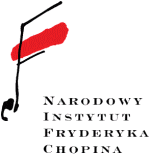 The 4th “Chopin and His Europe” Festival will be held from 15-31 August, 2008 in Warsaw. Inaugurated in 2005, this International celebration of Chopin and his legacy is organized by the Fryderyk Chopin Institute. The Festival will open with a concert at the Warsaw Philharmonic Concert Hall, featuring Ivo Pogorelich on piano with the Sinfonia Varsovia, Jacek Kaspszyk, conductor.
The 4th “Chopin and His Europe” Festival will be held from 15-31 August, 2008 in Warsaw. Inaugurated in 2005, this International celebration of Chopin and his legacy is organized by the Fryderyk Chopin Institute. The Festival will open with a concert at the Warsaw Philharmonic Concert Hall, featuring Ivo Pogorelich on piano with the Sinfonia Varsovia, Jacek Kaspszyk, conductor.
This year’s Festival theme is “from Pogorelich to Tchaikowsky.” A lively Festival schedule will feature over 200 performers and include 24 concerts, 9 symphonic programs, and 14 piano recitals and chamber concerts, performed on the following pianos: Steinway (2000, 2006), Yamaha (2005, 2008), Erard (1849), Pleyel (1838), Graf (copy of instrument from ca. 1819), and Jacob Weimes (1807).
Music In Old Cracow
 The festival “Music in Old Cracow” has been around for 23 years now and each year organizers invite outstanding soloists, conductors, chamber groups and orchestras from around the world. The concerts are spread over 17 days and are held in exciting venues in and around Kraków: churches, museums, atriums and even in the Wieliczka Salt Mine, depending on the character of the concert.
The festival “Music in Old Cracow” has been around for 23 years now and each year organizers invite outstanding soloists, conductors, chamber groups and orchestras from around the world. The concerts are spread over 17 days and are held in exciting venues in and around Kraków: churches, museums, atriums and even in the Wieliczka Salt Mine, depending on the character of the concert.
The festival is organized by Capella Cracoviensis under patronage of the President of the City of Kraków and funded by the City of Kraków, local government and the Ministry of Culture. For more information please visit the Capella Cracoviensis website.
Chopin Fest In Duszniki Zdrój
 The International Chopin Piano Festivals in Duszniki Zdrój have been held annually for the last sixty years. The Chopin Manor is a unique place where several generations of artists, and fans of both Chopin and piano music in general have been convening. This is the oldest Polish music festival, and probably the oldest piano festival in the whole world that has been held continuously over the years. Good friends of the Polish Music Center, Tomasz Strahl and Krzysztof Jabłoński will be performing at this year’s festival, amongst many other talented musicians. For more details, visit: www.chopin.festival.pl.
The International Chopin Piano Festivals in Duszniki Zdrój have been held annually for the last sixty years. The Chopin Manor is a unique place where several generations of artists, and fans of both Chopin and piano music in general have been convening. This is the oldest Polish music festival, and probably the oldest piano festival in the whole world that has been held continuously over the years. Good friends of the Polish Music Center, Tomasz Strahl and Krzysztof Jabłoński will be performing at this year’s festival, amongst many other talented musicians. For more details, visit: www.chopin.festival.pl.
Old Jazz Meeting – Golden Washboard
The 38th edition of the “Old Jazz Meeting – Golden Washboard 2008” Festival will take place in Iława between August 8-10. The competition and festival are dedicated to traditional jazz. It was established in 1965 and, though it has morphed through different forms, it continues today with the original intention. This year there are 8 jazz ensembles competing for the “Golden Washboard” award:
- Big Band Małopolski from Przytkowice near Kalwaria Zebrzydowska
- Dixie Tiger’s Band from Wrocław
- Sebastian Plewiński, jazz vocalist
- Enerjazzer from Gliwice
- Coco Dixie from Radymno
- Małgorzata Główka, jazz vocalist
- Adam Jarzmik Trio
- Małgorzata Nakonieczna, jazz vocalist
The Festival aspect features concerts by some of the best traditional jazz artists: Rapid Emotions, Shakin’ Dudi, Polish-Swedish Connection, Ivan Mladek & Banjo Band, and others. For more information please visit www.zlotatarka.pl.
Summer Festival Of The New Town
This brand new festival was created by the New Chamber Orchestra Foundation in Warsaw and will take place between August 3 and 31 in several churches around Warsaw. The goal of the foundation is to promote music to the widest possible audience and help develop young musical talents. The foundation has created an orchestra, led by Paweł Kos-Nowicki, which already has received a warm reception from audiences and artists.
The program of the festival this year includes four concerts, two performed by the New Chamber Orchestra and one each by the Camerata Quartet and Essentia Musica Ensemble. The soloists include Marta Boberska, soprano and Zbigniew Pilch, violin. Admission to all the concerts is free.
Learn more about the foundation, orchestra and the festival by visiting www.fnok.pl.
Music In Paradise
 The 6th edition of the “Music in Paradise” festival will take place between August 16 and 24 in Paradyż [Paradise], a Cistercian Monastery complex in Poland. The festival is co-organized by the “Canor” Early Music Foundation and the Seminary School in Paradyż. Each day of the festival there will be several concerts featuring solo, chamber and full symphonic repertoire from early to contemporary composers. This year the festival has invited some highly esteemed guest artists such as Maria Keohane – soprano, June Telletxea – soprano, Maria Sanner – alto, Bolette Roed – block flute, Corina Marti – flute, Michał Gondko – lute, Emmanuel Balssa – viola da gamba, Andreas Arend – lute, Allan Rasmussen – harpsichord and Alexis Kossenko – recorder. Also featured will be the “La Morra” and “Ars Choralis” ensembles. As is the tradition, the “Arte dei Suonatori” orchestra will be the musical host of the festival.
The 6th edition of the “Music in Paradise” festival will take place between August 16 and 24 in Paradyż [Paradise], a Cistercian Monastery complex in Poland. The festival is co-organized by the “Canor” Early Music Foundation and the Seminary School in Paradyż. Each day of the festival there will be several concerts featuring solo, chamber and full symphonic repertoire from early to contemporary composers. This year the festival has invited some highly esteemed guest artists such as Maria Keohane – soprano, June Telletxea – soprano, Maria Sanner – alto, Bolette Roed – block flute, Corina Marti – flute, Michał Gondko – lute, Emmanuel Balssa – viola da gamba, Andreas Arend – lute, Allan Rasmussen – harpsichord and Alexis Kossenko – recorder. Also featured will be the “La Morra” and “Ars Choralis” ensembles. As is the tradition, the “Arte dei Suonatori” orchestra will be the musical host of the festival.
For more information about the festival, monastery, region and a detailed program with information about the soloists please visit www.muzykawraju.pl.
Forum Musicum
 The Forum Musicum Festival has been around since 2003 and is dedicated to classical music performed on period instruments and using period interpretation style. It is held annually in August, this year between August 2 and 28.
The Forum Musicum Festival has been around since 2003 and is dedicated to classical music performed on period instruments and using period interpretation style. It is held annually in August, this year between August 2 and 28.
The festival is centered around repertoire from 1600 to 1800, a time of great composers, enlightenment and the birth of modern times. The theme of this year’s edition is “Architecture as Musical Space.” The reason for this title is the fact that music of this time was generally written for a specific performance space, be it a church, theater, castle, salon, concert hall or open air. Keeping this in mind the organizers will present the music in some well known spaces, but used in unusual ways.
For more information about the festival please visit www.forummusicum.com.
Organ Festivals Throughout Poland
- 7th “L’arte Organica” Festival of Organ Music: Nowy Sącz, July 11 – August 22
- 18th International “Summer Organ Concerts” Festival: Kraków, June 26 – August 14
- 51st International Organ Music Festival at the Oliwa Cathedral: Gdańsk-Oliwa, June 24 – August 26, 2008
More information is available on the website of the Adam Mickiewicz Inst, culture.pl.
Discography
Review: Poland Abroad Series
By Gary Fitelberg
POLAND ABROAD
Vol. I – Music for Strings: Laks, Tansman, Fitelberg, Karłowicz, Editions Abseit – EDA 26
Vol. II – Symphonic Poems: Fitelberg, Morawski, Laks, Tansman – Editions Abseit – EDA27
Editions Abseit (EDA) has created a CD series entitled “Poland Abroad.” The concept was initiated by several special and talented individuals who were instrumental to its success, especially Frank Harders-Wuthenow, the founder of EDA, and conductor Jürgen Bruns. It was conceived as a thematic continuation of the festival “Poland in the heart – Composing abroad: Polish Composers in Europe 1850-1950,” which was organized by Berlin’s Konzerthaus in collaboration with the Berlin University of Arts and Deutschlandradio Kultur and took place on October 22 – 30, 2004. One can only express appreciation and excitement for the very idea of such a series.
After Poland lost its sovereignty by the end of the 18th century, many generations of Polish intellectuals and artists were forced to develop their talents abroad. The cultural centers ofBerlin and Paris became instrumental to the career development of many Polish composers. Once Poland regained its independence, Nazi and Soviet persecution caused the exile of many more artists, intellectuals and musicians, to France, Germany, Britain, and even the USA. With its “Poland Abroad” series, EDA Records provides an exploration and even repatriation of the music of these exiles. It pays special tribute to all aspects of Polish musical history and life, and counters the adverse consequences and cultural destruction of the Shoah.
 Volume I of the “Poland Abroad” series is dedicated to works for string orchestra, and features Jerzy Fitelberg and his Concerto(1928), Mieczysław Karłowicz and his Serenade, Op. 2 (1897) Szymon Laks and his Sinfonettia (1936), and Alexandre Tansman and his Triptyque (1930). The program is performed by the Kammersymphonie Berlin, under the baton of Jürgen Bruns.
Volume I of the “Poland Abroad” series is dedicated to works for string orchestra, and features Jerzy Fitelberg and his Concerto(1928), Mieczysław Karłowicz and his Serenade, Op. 2 (1897) Szymon Laks and his Sinfonettia (1936), and Alexandre Tansman and his Triptyque (1930). The program is performed by the Kammersymphonie Berlin, under the baton of Jürgen Bruns.
 Volume II of the “Poland Abroad” series is dedicated to symphonic poems, with Grzegorz Fitelberg and his Song of the Falcon(1905), Eugeniusz Morawski and his Nevermore (1911), Szymon Laks and his Poème (1954), and Alexandre Tansman and his Hommage à Erasme (1968-69). This time the performers are the Brandenburg State Orchestra of Frankfurt, with virtuoso violin soloist Klaudyna Schulze-Broniewska and Jürgen Bruns, conductor. This archival recording was made during a concert of the “Music Festival on the Oder River” on March 12, 2006.
Volume II of the “Poland Abroad” series is dedicated to symphonic poems, with Grzegorz Fitelberg and his Song of the Falcon(1905), Eugeniusz Morawski and his Nevermore (1911), Szymon Laks and his Poème (1954), and Alexandre Tansman and his Hommage à Erasme (1968-69). This time the performers are the Brandenburg State Orchestra of Frankfurt, with virtuoso violin soloist Klaudyna Schulze-Broniewska and Jürgen Bruns, conductor. This archival recording was made during a concert of the “Music Festival on the Oder River” on March 12, 2006.
One can clearly see interesting comparisons and connections between these composers and compositions, finding both differences and similarities. There are threads weaving the tapestry together, although some are not as obvious as they might seem.
One could draw a close connection between Fitelberg’s Song of the Falcon (1905) and Morawski’s Nevermore (1911) based on their exploration of the subject and symbolism of the bird. Song of the Falcon is based on an episode from the Russian short story of the same name (1895) authored by Maxim Gorky. A mortally wounded falcon tells a snake of her fascination with flying and freedom. Nevermore was composed almost six years later in Paris. Like Fitelberg’s Song of the Falcon, the literary program is based on the symbolic figure of a bird – the ideas for which the birds stand, however, could not be more different. Edgar Allan Poe’s poem The Raven (1845) is considered a classic of nineteenth century American literature, filled with dark and despairing lyricism. Nevermore is the only word spoken by the raven, repeated over and over again. The unfortunate bird represents sadness, the irretrievable loss of love, and fatalism, and is a haunting, ghostly and menacing figure.
Despite the fact Morawski was a contemporary of Fitelberg, the two did not enjoy a close relationship, either personally or professionally. Both studied composition and theory with Noskowski, and shared the influence of Mahler and Strauss. But that is where the similarities stop and differences divide them. A conflict between Morawski and Szymanowski and his supporters, amongst them close colleagues and friends, created ambivalence, animosity, and perhaps even rivalry within the small but often discordant musical circles in Poland. After spending many years in Paris, Morawski returned to Poland in 1930 and succeeded Szymanowski as Rector of the Warsaw Conservatory in 1932.
 Although he was one of the greatest Polish composers of the early twentieth century, Mieczysław Karłowicz (pictured at right) was not linked to contemporaries like Laks or Tansman through shared Jewish heritage or religion. Instead, Karłowicz’s connection to the composers on these discs comes from his association with the group of composers known as “Młoda Polska” [Young Poland], whose members included founder Grzegorz Fitelberg (father of Jerzy), Apolinary Szeluto, and Karol Szymanowski, also known as the father of modern Polish music.
Although he was one of the greatest Polish composers of the early twentieth century, Mieczysław Karłowicz (pictured at right) was not linked to contemporaries like Laks or Tansman through shared Jewish heritage or religion. Instead, Karłowicz’s connection to the composers on these discs comes from his association with the group of composers known as “Młoda Polska” [Young Poland], whose members included founder Grzegorz Fitelberg (father of Jerzy), Apolinary Szeluto, and Karol Szymanowski, also known as the father of modern Polish music.
Szymon Laks was interned in Auschwitz, and having suffered the deprivations of life in a concentration camp, required a long, post-WWII period of convalescence in France. Poème was Laks’ first major orchestral composition after the war. It had no immediate prospect of performance and, more than anything else, was intended as music of reflection.
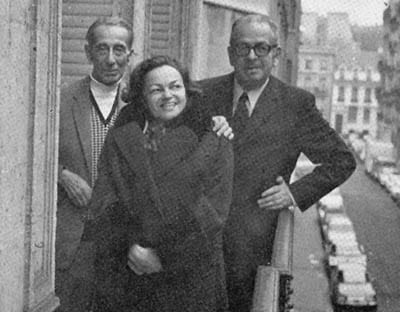
Having settled in France in 1919 and survived the war in exile in California, Alexandre Tansman lived out his life in relative comfort and success. By the time he received a commission to compose Hommage à Erasme in 1968, his enormous symphonic oeuvrewas already nearly complete. Tansman’s impressive output left him no need to prove anything to anyone, thus he sought his desired goal of expressing reflection and meditation through music.
Kennedy’s New Album
 Nigel Kennedy – A Very Nice Album
Nigel Kennedy – A Very Nice Album
The Nigel Kennedy Quintet: Nigel Kennedy-electric violin, Tomasz Grzegorski-tenor sax, Piotr Wyleżoł-piano and Hammond organ, Adam Kowalewski-electric bass, Paweł Dobrowolski-drums, Xantoné Blacq and Chris Lung-vocals
EMI Classics 5099921317125 (mini site)
This brand new 2CDs-set of jazz/world-influenced music from the Nigel Kennedy Quintet, with featured guests, presents works written by the irrepressible violinist himself.
Nigel divides his life between London, Kraków, and international tours, while serving in the coveted position of Artistic Director of the Polish Chamber Orchestra and being a major player in Poland’s thriving jazz scene. Over recent years, Kennedy has been influenced by the wide variety of music he has encountered in the country, establishing a deep rapport with many of Poland’s finest jazz musicians, several of whom now form his Quintet.
The album includes vocal tracks on which vocalist Xantoné Blacq performs his own lyrics. Blacq is instantly recognizable as one of the key musician/vocalists in Amy Winehouse’s band and his rich soul-inspired voice perfectly complements the music of A very Nice Album. Nigel himself also provides the vocals on a few of the tracks…
The iTunes exclusive release also includes a bonus track, a radio edit of Carnivore, on which Nigel and Xantoné duet with exhilarating results.
Oktawia
 Polish musician Oktawia Kawecka has just recorded her first album highlighting her talents as a jazz singer. The disc is sung completely in English, but highlights many Polish artists, including a song by Poland’s first Oscar winner for Music, Bronisław Kaper. The album will be released in Poland in October 2008.
Polish musician Oktawia Kawecka has just recorded her first album highlighting her talents as a jazz singer. The disc is sung completely in English, but highlights many Polish artists, including a song by Poland’s first Oscar winner for Music, Bronisław Kaper. The album will be released in Poland in October 2008.
Oktawia Kawecka, born in Radom, Poland, is a vocalist, flute player, arranger, and also the leader of her own band. She performs her own arrangements, including different shades of jazz and worldwide standards of classical music, which she arranges by combining fresh and modern sounds while maintaining her devotion to mainstream jazz. Her repertoire includes songs in Polish, English, French, Spanish, Greek, Portuguese and Italian. She is currently studying at the F. Chopin Music Academy in Warsaw, Poland.
[Source: AllAboutJazz]
New From Polish Radio
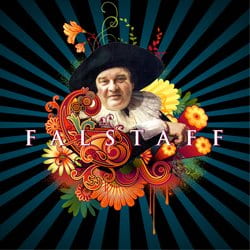 Falstaff
Falstaff
Giuseppe Verdi: Falstaff
Adam Kruszewski (baritone), Artur Ruciński (baritone), Rafał Bartmiński (tenor), Jerzy Knetig (tenor), Krzysztof Kur (tenor), Remigiusz Łukomski (bass), Izabella Kłosińska (soprano), Katarzyna Trylnik (soprano), Joanna Cortes (alto), Małgorzata Pańko (mezzo-soprano), Polish Radio Symphony Orchestra and Choir; Łukasz Borowicz, conductor
PRCD 1084-85
This double CD recording of Verdi’s opera Falstaff features a live performance in Polish Radio’s Lutosławski Concert Studio on September 8, 2007 at the inauguration the 2007/08 season of the Polish Radio Symphony Orchestra with its new director, Łukasz Borowicz.
The album includes a comprehensive booklet with artist bios, a fragment of Piotr Kamiński’s book 1000 and 1 Operas, and the original (Italian) and translated (Polish) libretto. The new translation was prepared by Radosław Kłos.
New from DUX
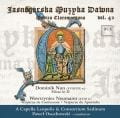 Jasnogórska Muzyka Dawna vol. 42
Jasnogórska Muzyka Dawna vol. 42
Dominik Nun – Mass in D Major; Wawrzyniec Neumann – Vespers about Worshippers, Vespers about Apostoles
Mariusz Godlewski, bass; Agnieszka Monasterska, alto; Katarzyna Wiwer, soprano; A Capella Leopolis & Consortium Sedinum; Paweł Osuchowski, conductor
DUX 0359
 Młodzi Kompozytorzy w Hołdzie Fryderykowi Chopinowi [Young Composer’s Hommage to F. Chopin]
Młodzi Kompozytorzy w Hołdzie Fryderykowi Chopinowi [Young Composer’s Hommage to F. Chopin]
Various composers
Various artists
DUX 0635
This double CD release includes compositions by 14 young Polish composers performed by an even more impressive list of young and upcoming as well as established Polish musicians and ensembles.
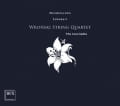 The Inevitable
The Inevitable
Felix Mendelssohn-Bartholdy – String Quartet in F Minor Op. 80 no. 6; Franz Schubert – String Quartet in D Minor D 810 “Death and the Maiden”
Wroński String Quartet: Marek Wroński, violin I; Małgorzata Chrzanowska, violin II; Emilia Wardak, viola; Barbara Piotrowska, cello
DUX 0637
Anniversaries
Born This Month
- August 4, 1879 – Józef REISS, musicologist, Polish music expert (d. 1956)
- August 7, 1935 – Monika (Izabela) GORCZYCKA, musicologist (d. 1962)
- August 8, 1946 – Mieczyslaw MAZUREK, composer, teacher, choral conductor
- August 8, 1897 – Stefan SLEDZINSKI, conductor, musicologist
- August 10, 1914 – Witold MALCUZYNSKI, pianist, student of Lefeld
- August 11, 1943 – Krzysztof MEYER, composer, musicologist
- August 17, 1907 – Zygmunt MYCIELSKI, composer, writer
- August 18, 1718 – Jacek SZCZUROWSKI, composer, Jesuit, priest (d. after 1773)
- August 20, 1889 – Witold FRIEMAN, composer, pianist
- August 21, 1933 – Zbigniew BUJARSKI, composer
- August 22, 1924 – Andrzej MARKOWSKI, composer and conductor
- August 23, 1925 – Wlodzimierz KOTONSKI, composer
- August 28, 1951 – Rafal AUGUSTYN, composer, music critic
- August 29, 1891 – Stefan STOINSKI, music etnographer, organizer, conductor (d. 1945)
- August 30, 1959 – Janusz STALMIERSKI, composer
Died This Month
- August 15, 1898 – Cezar TROMBINI, singer, director of Warsaw Opera (b. 1835)
- August 15, 1936 – Stanislaw NIEWIADOMSKI, composer, music critic
- August 17, 1871 – Karol TAUSIG, pianist and composer, student of Liszt (b. 1841)
- August 21 1925 – Karol NAMYSLOWSKI, folk musician, founder of folk ensemble
- August 22, 1966 – Apolinary SZELUTO, composer and pianist
- August 23, 1942 – Waclaw WODICZKO, conductor (b. 1858), grandfather of Bohdan, conductor
- August 27, 1865 – Józef NOWAKOWSKI, pianist, composer, student of Elsner, friend of Chopin
- August 29, 1886 – Emil SMIETANSKI, pianist, composer (b. 1845)





